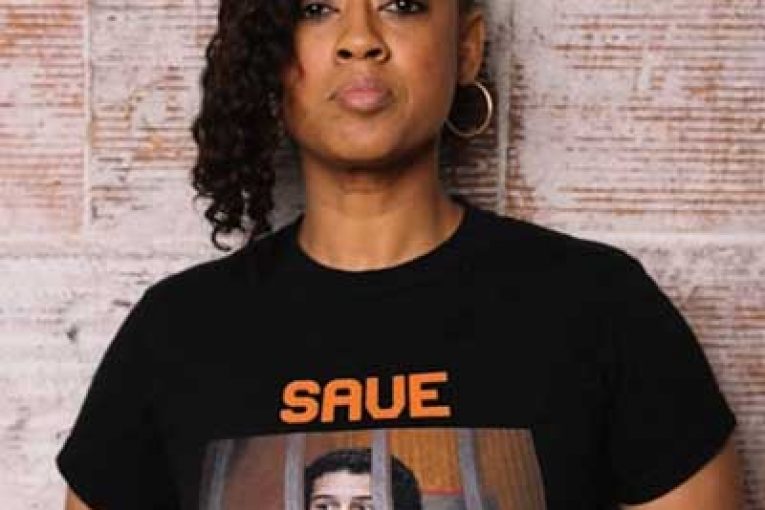

By Dylan Ferguson
CALIFORNIA – Jamilia Land—a member of the Abolish Slavery National Network (ASNN) in California and the founder of A.S.A.P, an organization centered on the mental health and well-being of children impacted by police and community murder, gun violence, and incarceration—hosted a webinar about abolishing slavery, mass incarceration, and involuntary servitude Monday.
Abolish Slavery National Network is a national coalition that is fighting to abolish constitutional slavery and involuntary servitude in all forms for all people, and believes that all people are protected by their state and federal constitutions.
The panel featured Max Parthas, a host on Abolition Today and a member of ASNN, Dennis Febo, the CEO of Guazabara Insights and an ASNN member in New Jersey, and Samuel Brown, the founder of the 10p program and a member of ASNN in California.
The conversation mainly emphasized the need to get rid of language in the constitutions that allows for slavery and involuntary servitude.
In 2020, the ASNN coalition members were able to successfully get rid of this language and abolish slavery language without any caveats in Utah and Nebraska. Max Parthas stated, “Utah had as  much as 80 percent of the people voting to end slavery” and Nebraska had around 60 percent.
much as 80 percent of the people voting to end slavery” and Nebraska had around 60 percent.
The ASNN also worked in Alabama to get the fourth amendment passed, which will allow government officials to take out any racist language. With the largest constitution in the world, Alabama has a lot of “race-based” or “slavery-based” language that needs to be taken out, ASNN said.
Parthas mentioned that the ASNN has plans to meet with Alabama government officials in two weeks in order to work on removing the exception clause of slavery from their constitution.
The ASNN does not just work on language in state constitutions, they also work to remove slavery language in general. Specifically, with changing the name of the state of Rhode Island from “Rhode Island and Providence Plantations” to just Rhode Island in June 2020.
Dennis Febo passionately discussed how our criminal justice system is driven by the incentive of profiting off of human bodies. He asked the audience to consider how much it costs from the moment a person is placed in handcuffs, to the moment justice is being served, to when that person is released.
Febo said that “per human body, you can calculate how much it costs” if you know on average how many people go through this in your state every year. He continued by saying that those incarcerated each “represent a monetary amount per day, per year.”
Febo then raised the question, asking “what is the difference between now and pre-1865?” He argued that there are still ledgers. Ledgers that were once used for cattle, property, and naming slaves. The criminal justice system does the same thing, prisoners “not only represent a monetary value,” but they are now insured with things, such as bonds.
“The same exact structures that were in place then are in place today,” Febo said.
So how do we move forward when our foundations are rooted in stripping humanity away from people? Febo suggested that we have to begin to hold people accountable. “We have to acknowledge that justice cannot be justice, if everything is based on money,” he said.
Samuel Brown spoke to this statement. As a man who has been incarcerated for the last two decades and attended this conversation via phone call from a facility, he has become intimate with involuntary servitude.
Brown is currently being paid 55 cents per hour to clean COVID-19 cells in the facility where he is imprisoned. Brown risks his health and safety and recalls that he “was scared for his life” the first time he cleaned a cell.
Over the last 24 years, Brown has become familiar with the prison system. He notes that it could be very beneficial to provide opportunities for people that have been incarcerated for an extended period of time. Things such as support services, vocational training programs, and getting compensated for the work prisoners do could equip them to survive in society—not set them up to return.
Brown knows that the pandemic has been difficult for everyone, but he suggested that the audience imagine what it would be like for prisoners to be released without things like support services, vocational training, or compensation, especially due to how COVID-19 has negatively impacted Americans throughout 2020.
An unfair disadvantage has always been placed on those incarcerated, but it has been emphasized by COVID-19. Brown believes that if prisoners were trained and paid, it could make them more employable.
 Dylan Ferguson is a second-year at Westmont College, majoring in kinesiology with a minor in Spanish. She is from Las Vegas, Nevada.
Dylan Ferguson is a second-year at Westmont College, majoring in kinesiology with a minor in Spanish. She is from Las Vegas, Nevada.
To sign up for our new newsletter – Everyday Injustice – https://tinyurl.com/yyultcf9
Support our work – to become a sustaining at $5 – $10- $25 per month hit the link:
I am not surprised that language remains in state constitutions that were from slavery times and may allow it. However, no examples were given, even when states were cited. The only example given was the name change for Rhode Island, and while “plantation” has implications, the word being in a state name doesn’t in and of itself allow for slavery. Understanding what remains and/or what was recently removed in Utah and Alabama for example would be helpful.
One example is actually the language of the 13th Amendment which abolishes slavery except for as punishment for crime, there are very interesting studies about the use of that “loophole” to create involuntary servitude in the south as late as the Great Depression even the 1950s. There is Douglas Blackmon’s award-winning book, “Slavery By Another Name”
“The Other Slavery” chronicles the history of the slavery of Indians in the New World, including the US. I was surprised to learn how recently that practice stopped, including in California.
Bottom line is there is a lot of research on this, and most of the provisions in the constitution that allowed that in the past have not been changed.
Thanks for not answering my question. I didn’t ask to be referred to a book. I asked what language was removed from the constitutions of Utah and Alabama. The article talks about slavery, but then morphs into talking about incarceration as a form of slavery. The reason I asked about the language was that it wasn’t clear to me if the language sought to be removed was about working under incarceration because the author is arguing that incarceration is a form of slavery, or if the language sought to be removed supportive of the broader understanding of slavery? The only example was a removal of a word from a state name which was a decent symbolic gesture, but in actuality does neither. I’m willing to hear the argument about incarceration as slavery. This article, however, is all over the map.
Je d’accord… I was hesitating, not wanting to be the first to point that out…
Alabama, until recently, had unenforceable language in its constitution saying “Separate schools shall be provided for white and colored children, and no child of either race shall be permitted to attend a school of the other race.” The Utah constitution provided: “Neither slavery nor involuntary servitude, except as a punishment for crime, whereof the party shall have been duly convicted shall exist within this State.”
Thanks EG. That was what I wanted to know. The first is reprehensible and it’s amazing it stayed on the books. The Utah law – am I not reading it right – sounds like it prohibits slavery?
Color code
Black – unaddressed.
Red – Abolished.
Blue – Legislation process/ballot initiative.
Green – Organizing.
1 Alabama: That no form of slavery shall exist in this state; and there shall not be any involuntary servitude, otherwise than for the punishment of crime, of which the party shall have been duly convicted. Alabama Constitution, Section 32
2 Arkansas: There shall be no slavery in this State, nor involuntary servitude, except as a punishment for crime. No standing army shall be kept in time of peace; the military shall, at all times, be in strict subordination to the civil power; and no soldier shall be quartered in any house, or on any premises, without the consent of the owner, in time of peace; nor in time of war, except in a manner prescribed by law. Arkansas Constitution, Article 2, Section 25.
3 California: Slavery is prohibited. Involuntary servitude is prohibited, except to punish crime. Article I, Section 6.
4 Colorado: There shall never be in this state either slavery or involuntary servitude. Colorado Constitution Article 2, Section 26 (Amended 2018)
5 Georgia: There shall be no involuntary servitude within the State of Georgia except as a punishment for crime after legal conviction thereof or for contempt of court. Article I, Section 1 Paragraph XXII.
6 Indiana: There shall be neither slavery, nor involuntary servitude, within the State, otherwise than for the punishment of crimes, whereof the party shall have been duly convicted. Article 1, Section 37
7 Iowa: There shall be no slavery in this State; nor shall there be involuntary servitude, unless for the punishment of crime. Article I, Section 23
8 Kansas: There shall be no slavery in this state; and no involuntary servitude, except for the punishment of crime, whereof the party shall have been duly convicted.
9 Kentucky: Slavery and involuntary servitude in this state are forbidden, except as a punishment of crimes, whereof the party shall have been duly convicted. Article I, Section 25
10 Louisiana: No person shall be denied the equal protection of the laws. No law shall discriminate against a person because of race or religious ideas, beliefs, or affiliations. No law shall arbitrarily, capriciously, or unreasonably discriminate against a person because of birth, age, sex, culture, physical condition, or political ideas or affiliations. Slavery and involuntary servitude are prohibited, except in the latter case as punishment for crime. Article I, Section 3.
11 Maryland: An Act for the Gradual Abolition of Slavery” by a vote of 34 to 21 on March 1, 1870
12 Michigan: Neither slavery nor involuntary servitude, unless for the punishment of crimes, shall ever be tolerated in this State. Article I, Section 9.
13 Minnesota: No member of this state shall be disfranchised or deprived of any of the rights or privileges secured to any citizen thereof, unless by the law of the land or the judgement of his peers. There shall be neither slavery nor involuntary servitude in the state, otherwise than as punishment for a crime of which the party has been convicted. Article I, Section 2
14 Mississippi: There shall be neither slavery nor involuntary servitude in this State, otherwise than in the punishment of crime, whereof the party shall have been duly convicted. Article 3, Section 15
15 Missouri Emancipation Ordinance of Missouri
An ordinance abolishing slavery in Missouri 1/11/1865
SEC. 2. That Slavery, or involuntary servitude, except in punishment of crime, shall cease to exist in Missouri on the 4th of July. 1870 and all slaves within the State on that day are hereby declared to be free. Provided, however, that all persons emancipated by this ordinance shall remain under the control and be subject to their late owners, or their legal representatives, as servants during the following period to wit: Those over ??? years of age, for and during their lives; those under 12, until they arrive at the age of 23; and those of all other ages, until the Fourth of July, 1876. The persons, or their legal representatives, who, up to the moment of emancipation, were owners of slaves thereby freed, shall, during the period for which the services of such freedmen are reserved to them, have the same authority and control over the said freedmen for the purpose of receiving the possessions and services of the same that are now held by the master in respect of his slaves: provided, however, that after the said 4th of July, 1870, no person so held to service shall be sold to non-residents, or removed from the State by authority of his late owner, or his legal representative.
16 Nebraska: There shall be neither slavery nor involuntary servitude in this state, otherwise than for the punishment of crime, whereof the party shall have been duly convicted. Article I, Section 2 (there is a 2020 amendment intended to remove the exception (AMENDED TO REMOVE SLAVERY LANGUAGE IN 2020)
17 Nevada: Neither slavery nor involuntary servitude, unless for the punishment of crimes, shall ever be tolerated in this State. Article 1, Section 17.
18 North Carolina: Slavery is forever prohibited. Involuntary servitude, except as a punishment for crime whereof the parties have been adjudged guilty, is forever prohibited.
19 North Dakota: Neither slavery nor involuntary servitude, unless for the punishment of crimes, shall ever be tolerated in this State. Article 1, Section 17
20 Ohio: There shall be no slavery in this state; nor involuntary servitude, unless for the punishment of crime. Article I, Section 6.
21 Oregon: There shall be neither slavery nor involuntary servitude in the State, otherwise than for the punishment of crime, of which the party shall have been duly convicted. Article 1, Section 34
22 Tennessee: That slavery and involuntary servitude, except as a punishment for crime, whereof the party shall have been duly convicted, are forever prohibited in this state. Article 1, Section 33
The General Assembly shall make no law recognizing the right of property in man. Article 1, Section 34
23 Utah: Neither slavery nor involuntary servitude, except as a punishment for crime, whereof the party shall have been duly convicted, shall exist within this State. Article I, Section 21 (there is a 2020 amendment to remove the exception[5][6]) (AMENDED TO REMOVE SLAVERY LANGUAGE IN 2020)
24 Vermont: That all men are born equally free and independent, and have certain natural, inherent, and unalienable rights, amongst which are the enjoying and defending life and liberty, acquiring, possessing and protecting property, and pursuing and obtaining happiness and safety; therefore no person born in this country, or brought from over sea, ought to be holden by law, to serve any person as a servant, slave or apprentice, after he arrives to the age of twenty-one years, unless he is bound by his own consent, after he arrives to such age, or bound by law for the payment of debts, damages, fines, costs, or the like. Chapter I, Article 1st
25 Wisconsin: There shall be neither slavery, nor involuntary servitude in this state, otherwise than for the punishment of crime, of which the party shall have been duly convicted.
26 Washington, DC: 1862 An Act for the Release of certain Persons held to Service or Labor in the District of Columbia
Be it enacted by the Senate and House of Representatives of the United States of America in Congress assembled, That all persons held to service or labor within the District of Columbia by reason of African descent are hereby discharged and freed of and from all claim to such service or labor; and from and after the passage of this act neither slavery nor involuntary servitude, except for crime, whereof the party shall be duly convicted, shall hereafter exist in said District.
27: Puerto Rico: No existirá la esclavitud, ni forma alguna de servidumbre involuntaria salvo la que pueda imponerse por causa de delito, previa sentencia condenatoria.
States adding anti-slavery language:
1- New Jersey
2- Texas
Data compiled by Max Parthas
Abolish Slavery National Network
AbolishSlavery.us
Abolitiontoday.org
Yes… the morphing, twisting, evolution of ‘language’… many farms (plant-ations) never had slaves… yet now, ‘plantation’ is considered synonymous with “slavery”… ‘white’ (referring to a person’s race) is trending toward being synonymous with ‘racist’, ‘biased’ and/or ‘privileged’…
All examples of “profiling”… which is inappropriate… and biased, racist, etc.
It is what it is…
https://abolishslavery.us/videos/